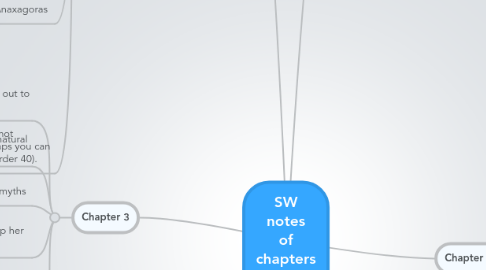
1. Chapter 3
1.1. Myth- Story about the gods which sets out to explain why life is as it is.
1.1.1. Used by people to explain events they didn't know about
1.1.1.1. Example: Nordic myths about Thor
1.1.1.1.1. When people couldn't wait for gods to act, they had religious assemblies and sacrifices
1.2. Aim of early philosophers was to find natural explanations for natural processes
1.3. Early Greek philosophers challenged myths
1.3.1. Philosophy- new way of thinking evolved in Greece about 600 BCE
1.4. Sophie realizes this is true and makes up her own explanation for why gardens work
1.5. "Would she try to invent some kind of explanation for why it suddenly started to rain one day? Would she work out some fantasy to explain where the snow went and why the sun rose in the morning? Yes, she definitely would" (Gaarder 27).
2. Chapter 4
2.1. Early Greek philosophers concerned with natural world- called natural philosophers
2.1.1. Nature constantly transformed, but how could transformations occur- philosophers wanted to understand this
2.1.2. took first step in direction of scientific reasoning
2.1.3. Thought all things originated from one thing
2.2. Project- what each philosopher is concerned about finding- important to keep in mind
2.3. Philosophy came from religion
2.4. 3 Philosophers from Miletus
2.4.1. Thales
2.4.1.1. Measured Pyramid and predicted solar eclipse, believed all life came from water
2.4.2. Anaximander
2.4.2.1. Thought world was boundless
2.4.3. Anaximenes
2.4.3.1. Thought source of all things must be air vapor
2.5. Problem of change- how could one substance suddenly change into something else
2.6. Parmenides
2.6.1. philosopher- Eleatic- everything that exists had always existed (nothing can come out of nothing)
2.6.2. Senses told him things changed, therefore he decided his reasoning was correct and his senses weren't. rationalism- unshakable faith in human reasoning.
2.7. Heraclitus
2.7.1. everything flows, or changes.
2.7.2. World characterized by opposites. Without this, there wouldn't be that.
2.7.3. Despised contemporaries
2.7.4. That that something was the source of everything, called it logos (God).
2.7.5. Senses= reliable
2.8. Empedocles
2.8.1. nothing changes (no one elements can change), but senses are correct
2.8.2. Nature consisted of four elements, or roots.
2.8.2.1. Earth
2.8.2.2. Air
2.8.2.3. Fire
2.8.2.4. Water
2.8.3. Things come from a mixture of these roots
2.8.3.1. Nothing changes
2.8.3.2. what happens is these things are combined or separated
2.8.4. 2 forces that make things change
2.8.4.1. Love- force that binds things together
2.8.4.2. Strife- force that breaks things apart
2.9. Anaxagoras
2.9.1. Believed nature was made up of an infinite number of minute particles invisible to the eye.
2.9.1.1. Everything can be divided into even smaller parts
2.9.1.2. Even in smallest parts there are fragments of all other things
2.9.1.3. called them seeds
2.9.2. Called force bringing all of these together mind or intelligence (nous)
2.9.3. Didn't believe that unexplained things were gods ex: the sun
2.10. "She decided that philosophy was not something you can learn; but perhaps you can learn to think philosophically" (Gaarder 40).
2.10.1. You have to use your own common sense
3. Chapter 1
3.1. Who Are You?- question asked to Sophie Amundsen, young girl. Question in an envelope Sophie has opened in the mail
3.1.1. Didn't chose who she is, she just is who she is
3.2. Ponders question of life after death after realizing she won't be alive forever
3.2.1. Can't experience life without experiencing death
3.3. Where does the world come from?
3.3.1. No one really knows, only inquires can be made
3.4. Sophie goes to her "den"
3.4.1. Ponders questions, finds them annoying, wonders who they came from
3.5. Gets mysterious card from Dad about a girl's birthday who she doesn't know, card addressed to Sophie
3.6. "They had to be, because until today she had lived a perfectly ordinary life (Gaarder 9).
4. Chapter 2
4.1. Philosophy involves questions that concern us all, why are who we are is one of these questions
4.2. "At school she had trouble concentrating on what the teachers said. They seemes to talk only about unimportant things. Why couldn't they talk about what a human being is--or about what the world is and how it came into being" (Gaarder 10)
4.3. Best away of approaching philosophy is to ask philosophical questions.
4.3.1. Not found in encyclodepia
4.3.2. Need to be thought through by ourselves, we each have are own view on life
4.3.3. Like a mystery
4.4. To be a good philosopher, one must wonder
4.4.1. Adults lose this characteristic, whoever philosophers still have it
4.4.2. People see things repeat over and over, then take them for granted
4.4.3. Habit causes use to lose wonder
